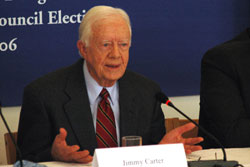CONTACT: (Note: To reach "0" numbers from abroad, dial +972 and delete "0")
NDI : Jean Freedberg, +1 (202) 728-5527, jeanf@ndi.org;
Michael Murphy, 057-722-0066, mmurphy@ndi.org
Carter Center: Jon Moor: +1 (404) 420-5107, jmoor@emory.edu;
Colin Stewart: 054-659-6335, colin_cci@yahoo.com
Large turnout seen as "a strong expression of Palestinians' desire to choose their representatives through open and competitive elections"
JERUSALEM -- Election observers with the National Democratic Institute (NDI) and The Carter Center today said that under the difficult circumstance of the ongoing conflict and occupation, yesterday's elections for the Palestinian Legislative Council "can be an important step on the road to greater democracy for the Palestinian people." The delegation's preliminary assessment of the parliamentary election, noting the high turnout at the polls yesterday and in the presidential and local elections over the past two years, concluded that "Palestinians have clearly demonstrated a commitment to democratic elections." It now falls upon the Palestinian political leadership to continue strengthening democratic institutions and addressing critical issues facing the Palestinian people, the observers said.
"It is now up to the elected leaders and representatives to construct genuinely democratic institutions and processes that will bring the peace and prosperity that the Palestinian people deserve, within a free and independent state," said the delegation in its report. "It is universally accepted that democratic elections and democratic governance are about employing peaceful means to achieve political goals. We hope these elections will mark a decisive move for the renunciation of violence by all groups and toward addressing corruption and other issues that are central to improving the lives of Palestinians."
The 85-member delegation observed voting in the West Bank, Gaza and East Jerusalem. The group was led by former U.S. President Jimmy Carter, former Swedish Prime Minister Carl Bildt, former Albanian President Rexhep Meidani, and former Spanish Foreign Minister Ana Palacio. It included elected officials, electoral and human rights experts, regional specialists, and political and civic leaders from 22 countries in Asia, Europe, the Middle East, Europe, Africa and North America.
"The obvious pride and enthusiasm of Palestinians about the election process was evident throughout the voting districts," the delegation report said. "This was reinforced by the professional and impartial performance of election officials."
The co-leaders released the delegation's statement at a press conference in Jerusalem, noting that the statement is a preliminary assessment because the final tabulation of results was not complete and that any electoral complaints which might be lodged will require further monitoring. Among the highlights of the observers' report:
The elections were not without problems, including the following major findings:
# # #
NDI is a nonprofit organization working to strengthen and expand democracy worldwide. NDI works with democrats in every region of the world to build political and civic organizations, safeguard elections, and to promote citizen participation, openness and accountability in government.
The Carter Center is a not-for-profit, nongovernmental organization, founded in 1982 by former U.S. President Jimmy Carter and his wife, Rosalynn, committed to advancing peace and health worldwide.

Former U.S. President Jimmy Carter speaks to reporters during a press conference held Jan. 26, 2006, following the Palestinian Legislative Council Elections.
Please sign up below for important news about the work of The Carter Center and special event invitations.